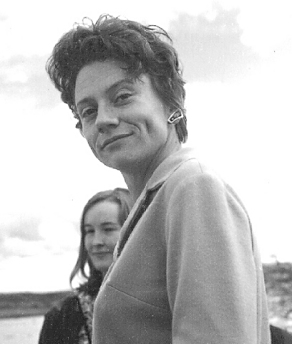Cynthia Irwin-Williams facts for kids
Quick facts for kids
Cynthia Irwin-Williams
|
|
|---|---|

Cynthia Irwin-Williams in 1964
|
|
| Born | April 14, 1936 |
| Died | 15 June 1990 (aged 54) |
| Alma mater |
|
| Known for | |
| Scientific career | |
| Fields | Anthropology, Archaeology |
Cynthia Irwin-Williams (April 14, 1936 – June 15, 1990) was an important archaeologist. She studied ancient cultures in the American Southwest. She earned her first degree in Anthropology from Radcliffe College in 1957. The next year, she received her master's degree. In 1963, she completed her studies with a PhD from Harvard University. Cynthia started her career in the 1950s. She was seen as a pioneer for women in archaeology, much like her friend Hannah Marie Wormington.
Contents
Discovering Ancient Cultures
Cynthia Irwin-Williams worked with her brother, Henry Irwin. He was also an archaeologist. They explored sites in Colorado from the mid-1950s to 1960. In 1966, Cynthia and Henry published a book. It shared their discoveries from the Magic Mountain Site. This excavation was done for the Peabody Museum of Harvard University in 1959–1960. They also worked at the nearby LoDaisKa Site between 1958 and 1960.
Understanding the Picosa Culture
In the 1960s, Cynthia defined the Picosa culture. This was an Archaic culture. The Archaic period was a time when people lived by hunting and gathering. The Picosa culture connected people from three different places. They shared similar tools and ways of life. Cynthia named it "Picosa" using parts of the names of these areas:
- Pinto Basin (PI)
- Cochise Tradition (CO)
- San Jose (SA)
The Oshara Tradition and Early Pueblo People
Irwin-Williams also studied the Oshara tradition. This culture came after the Picosa culture. She worked in the Arroyo Cuervo area of northwestern New Mexico. Cynthia believed that the Ancient Pueblo People, also known as Anasazi, partly developed from the Oshara culture. The Ancient Pueblo People were early Native American groups. They lived in the Southwestern United States.
Excavating the Hueyatlaco Site
In 1962, Cynthia led a team to dig at the Hueyatlaco site in Mexico. This site became famous for a debate about how old human activity there was. Despite many years of research, Cynthia Irwin-Williams never published a final report on this excavation.
About Cynthia's Life
Cynthia Irwin-Williams was born on April 14, 1936, in Denver, Colorado. She passed away on June 15, 1990, in Reno, Nevada. She had been ill for a long time.

